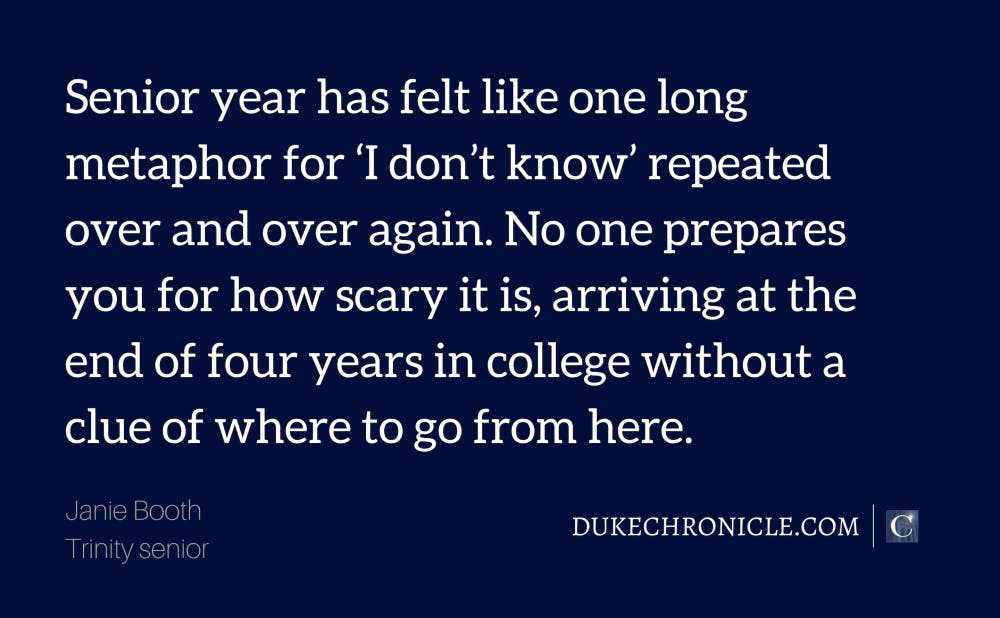“Why don’t you look it up for homework today?” was the response of my elementary school teacher whenever I raised my hand with a question too big to answer, ones like “When does infinity end?”, “Who put a hole in the ozone?” and “What makes the internet work?” My teacher would deflect as a way of saying “I don’t know” without actually admitting it.
A decade later, now in college, I am sitting in a biochemistry lecture and my professor began to talk about a disease for which doctors and scientists haven’t found a cause for. When a classmate raised their hand to ask about why it occurs in humans, Professor Coggins responded by saying “I don’t actually know. Scientists and doctors haven’t been able to find a cause for what is happening in our bodies.”
In almost four years of college, that was the first time I had ever heard a faculty member admit that the answer wasn’t certain, or explainable, or reachable through hard work and a Ph.D. dissertation.
But I’ve found that if you listen harder, encoded ways of saying ‘I don’t know’ appear all throughout our professional language.
In fact, there are hundreds of scientific terms for ‘we haven’t got a clue.’ When doctors can't determine the cause for a disease that arises spontaneously they call it “idiopathic.” Physicists use the term “fudge factors” in order to account for unanticipated differences between theory and experiment. Chemists attribute unexplained results of a reaction to a “combination of electronic and steric effects.” Statisticians label data points that don’t fit into the trend as “outliers.” Programmers just call it a computer error and move on. Astronomers write about the “contamination of an unknown origin,” which is probably science-speak for aliens.
Language encoding the phenomenon of “not knowing” isn’t only limited to science. When archaeologists don’t know how to classify an object from the ancient past, they say it was used for “ritual purposes.” Artists call their works “untitled,” and art historians label them as “avant-garde.” Librarians file items under “miscellaneous.” When journalists can’t make out words from a transcription, they label it [inaudible]. Poets just leave a bunch of empty spaces. Academics write that some questions are “outside the scope of this paper.” In religion, what is beyond human understanding is usually called a “holy mystery”, but could also be condensed into one really small word: God.
We resort to so many shorthand phrases to cover up the big, gaping hole in what we are certain of. I’m quick to fall back on this code, too. My most-used emoji is the smiley face with its eyebrows raised and hands gesturing a nice big shrug. Translation: I have no clue. When an acquaintance asks me where I’ll be working after graduation, I’ll say, “I’m looking at a few options.” Translation: I have no idea.
How many times have you not known the answer to a question on a test, only to scrape together a series of formulas or nonsense sentences to try to cover it up? There is a consequence for not knowing, and as I get older that stakes seem to get higher.
So often we try to mask what we don’t know—or can’t know—with language or formulas or emojis as a placeholder, because it’s easier to hide behind our own human lack of understanding with words and phrases like the ones listed. But I also think we use other words to describe what we don’t know out of the fear that we might never, ever know. Perhaps this recognition of the gap in our knowledge is the first in a series of steps pointing towards discovery.
Senior year has felt like one long metaphor for ‘I don’t know’ repeated over and over again. No one prepares you for how scary it is, arriving at the end of four years in college without a clue of where to go from here. After all, who made it a rule by the time we are 22 years old, we should have all of the unknowns—who we are, where we will live, who we will love—figured out?
When I unpacked my bags in Southgate almost four years ago, my original goal was to figure out the answers to all of these questions. Find my passion, fall in love, pick a city, get a job, checking off all the correct boxes of achievement along the way. Now, in my last semester of college, my new goal is just to finish. As I go, I’ll be repeating “I don’t know” as many times as it takes.
My favorite phrase for the uncertain is the one map makers from medieval times used to label areas that were dangerous or unexplored: here be dragons.
Looking around at the path before me as I am about to graduate from college, there are a lot of dragons. Pretty much nothing but dragons. Not knowing what my future looks like invites doubt, but also leaves so much room for risk, and courage, and love. And I’m excited to see what messy, beautiful things I discover along the way.
Janie Booth is a Trinity senior. Her column usually runs on alternate Tuesdays.
Get The Chronicle straight to your inbox
Signup for our weekly newsletter. Cancel at any time.

